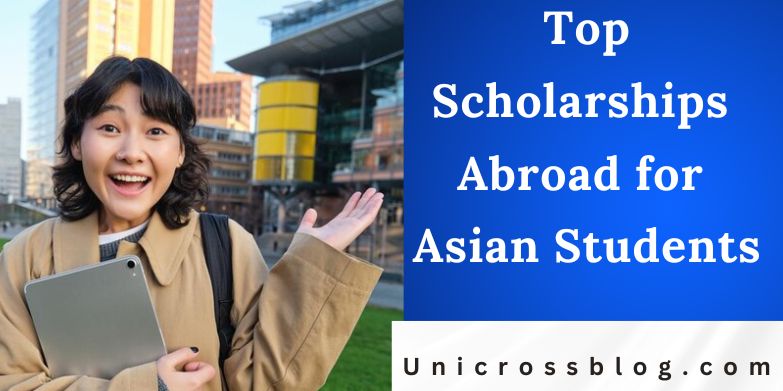Studying abroad opens doors to world-class education, cultural immersion, and global networks, but financial barriers often stand in the way. For Asian students spanning diverse regions from South Asia to Southeast Asia and beyond scholarships provide a vital lifeline. These opportunities not only cover tuition and living costs but also foster academic excellence and cross-cultural exchange. In 2025, with rising international enrollment, funding options have expanded, particularly in host countries like the US, UK, Australia, Canada, and even within Asia (e.g., Japan, Singapore, South Korea).
This guide highlights top scholarships tailored for Asian students, emphasizing fully or partially funded programs for undergraduate, master’s, and PhD levels. Eligibility typically includes strong academic records, leadership potential, and sometimes region-specific criteria.

Top Scholarships Abroad for Asian Students
1. Fulbright Foreign Student Program (United States)
The Fulbright Foreign Student Program, administered by the U.S. Department of State, is one of the most prestigious scholarship initiatives globally, fostering mutual understanding between the U.S. and other nations. For Asian students, it provides full funding for graduate (master’s) and PhD studies across disciplines such as STEM, social sciences, humanities, and arts at accredited U.S. universities. The scholarship covers tuition, round-trip airfare, health insurance, and a living stipend, typically ranging from $20,000 to $50,000 annually depending on the cost of living in the host city.
Open to citizens of over 150 countries, including major Asian nations like China, India, Indonesia, and Vietnam, the program emphasizes academic merit and leadership potential. Each year, thousands of Asian students apply through their home country’s U.S. embassy or Fulbright commission, with selection processes varying by country but generally requiring strong academic records, a clear study plan, and cultural adaptability. Deadlines typically fall between May and October 2025, so early preparation is critical to craft a competitive application.
2. Chevening Scholarships (United Kingdom)
Funded by the UK’s Foreign, Commonwealth & Development Office, Chevening Scholarships are a hallmark of excellence for aspiring leaders pursuing one-year master’s degrees at any UK university. The program fully funds tuition, a generous living allowance (approximately £18,000 or more annually), return airfare, and visa costs, making it accessible for Asian students from countries like India, China, Pakistan, and Indonesia, who form a significant portion of the 1,500+ annual awardees.
Chevening prioritizes candidates with demonstrable leadership and networking skills, often favoring fields like public policy, international relations, business, and law. Applicants must have at least two years of work experience and a clear vision for contributing to their home country’s development. The application process is rigorous, involving essays on leadership and career goals, with interviews conducted at British embassies. The deadline for 2025 is typically early November, requiring applicants to research programs and secure university offers concurrently.
3. Australia Awards Scholarships (Australia)
The Australia Awards, funded by the Australian government, aim to promote development and strengthen ties with partner countries, many of which are in Asia, including Indonesia, Vietnam, the Philippines, and Bangladesh. These scholarships support undergraduate and postgraduate studies, covering full tuition, a living allowance (approximately AUD 30,000 per year), health insurance, and return airfare.
With over 1,000 awards granted annually, the program targets fields aligned with sustainable development, such as agriculture, public health, and environmental science. Asian students benefit from tailored eligibility criteria, often requiring a commitment to return home and contribute to national progress. The application process involves demonstrating academic excellence and development impact, with deadlines typically between April and May 2025. Recipients also gain access to preparatory training, such as English language courses, enhancing their readiness for Australian academic life.
4. DAAD Scholarships (Germany)
The German Academic Exchange Service (DAAD) offers a range of scholarships for master’s and PhD programs, particularly appealing to Asian students in engineering, natural sciences, and social sciences. Fully funded awards cover tuition (often free at German public universities), a monthly stipend of €934, travel allowances, health insurance, and sometimes German language courses.
South and East Asian students from countries like India, China, and Thailand are among the top recipients, with programs like the DAAD’s Development-Related Postgraduate Courses targeting sustainable development. Short-term research grants are also available for PhD candidates. The application process varies by program, often requiring direct submission to DAAD or through partner universities, with deadlines typically from October to December 2025. Germany’s low living costs and strong academic reputation make this a compelling option for Asian scholars.
5. Vanier Canada Graduate Scholarships (Canada)
The Vanier Canada Graduate Scholarships support PhD students in health sciences, natural sciences, engineering, and humanities at Canadian universities. Valued at CAD 50,000 per year for three years, the scholarship covers tuition and living expenses, attracting top talent from Asia, particularly in STEM fields. Open to international students, it requires nomination by a Canadian university, meaning applicants must first secure admission. Asian candidates, especially from India and China, excel due to strong research profiles.
The selection criteria emphasize academic excellence, research potential, and leadership, with a rigorous evaluation process. The deadline for nominations is typically November 2025, and applicants should connect with prospective supervisors early to strengthen their candidacy.
6. MEXT Scholarships (Japan)
Japan’s Ministry of Education, Culture, Sports, Science and Technology (MEXT) offers fully funded scholarships for undergraduate, master’s, and PhD programs, making it a top choice for Asian students seeking to study in a culturally proximate yet globally competitive environment. Covering full tuition, a monthly stipend (¥117,000–¥242,000 depending on level), and round-trip airfare, MEXT supports diverse fields, from technology to Japanese culture and international relations.
The embassy-recommended pathway is most common for Asian applicants, requiring language proficiency (Japanese or English) and academic merit. Popular among students from Korea, China, and Southeast Asia, the program fosters regional collaboration. Deadlines typically fall between May and June 2025, with embassy screenings followed by university placements.
7. Singapore International Graduate Award (SINGA)
The SINGA scholarship, offered by Singapore’s Agency for Science, Technology and Research (A*STAR), funds PhD studies in biomedical sciences and engineering at top institutions like Nanyang Technological University (NTU) and National University of Singapore (NUS). Fully funded, it provides a S$2,700 monthly stipend, full tuition, a one-time settlement allowance (S$1,000), and airfare.
Open to all international students, SINGA prioritizes Asian applicants due to regional proximity and research alignment. The application process is straightforward, requiring academic transcripts, research proposals, and recommendation letters, with a deadline of December 1, 2025, for the 2026 intake. Singapore’s innovation hub status makes this ideal for STEM-focused Asian students.
8. Hong Kong PhD Fellowship Scheme (Hong Kong)
Established by Hong Kong’s Research Grants Council, this scheme supports PhD studies at eight leading universities, offering a HK$331,200 annual stipend and a HK$13,800 conference allowance for up to three years. Open to global applicants, it attracts Asian students from China, India, and Southeast Asia, particularly in research-intensive fields like engineering, sciences, and humanities.
No separate application is needed—candidates apply through university admissions, with a deadline of December 1, 2025. The fellowship’s generous funding and Hong Kong’s strategic position as an Asian academic hub make it highly competitive.
9. KAUST Fellowship (Saudi Arabia)
The King Abdullah University of Science and Technology (KAUST) Fellowship fully funds MS and PhD programs in STEM disciplines, offering tuition, a $20,000–$30,000 annual stipend, on-campus housing, medical insurance, and relocation support. Open to international students, it appeals to Asian applicants, particularly from India, Pakistan, and China, due to KAUST’s cutting-edge research facilities.
The application process is rolling, but applying by October 2025 ensures consideration for the 2026 intake. KAUST’s global outlook and generous funding make it a rising destination for Asian scholars.
10. Aga Khan Foundation International Scholarship Programme (Global)
The Aga Khan Foundation provides a unique 50% grant, 50% loan model for postgraduate studies in development-related fields, covering tuition and living costs up to $50,000. Prioritizing students from Asian countries like India, Pakistan, Bangladesh, and Afghanistan, it targets disciplines such as education, public health, and rural development.
Means-tested and highly selective, the program supports over 1,000 alumni globally. Applications, due by March 2025, require financial need documentation and a repayment commitment for the loan portion, making it accessible for students with limited resources.
READ ALSO: Short Course Scholarships for Professionals in 2025
FAQs
What documents are usually required?
Standard requirements include academic transcripts, a detailed CV, a personal statement or essay outlining goals, two to three recommendation letters from academic or professional referees, and proof of English proficiency (e.g., IELTS or TOEFL scores). Some programs, like MEXT, may waive language tests for certain pathways, while others, like Aga Khan, require financial need statements.
Can undergraduates apply?
Yes, scholarships like Australia Awards and MEXT support undergraduate studies, though many focus on graduate levels. Programs like the Freeman Awards for Asia (US-based) also fund short-term study abroad for undergraduates, particularly in Asia-focused disciplines.
How competitive are these scholarships?
Extremely competitive Chevening’s acceptance rate is 2–3%, and Fulbright varies by country but is similarly selective. Stand out by highlighting unique leadership experiences, aligning with the scholarship’s mission, and submitting polished applications.







